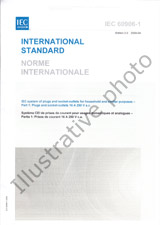We need your consent to use the individual data so that you can see information about your interests, among other things. Click "OK" to give your consent.

IEC/TS 63265-ed.1.0
Photovoltaic power systems - Reliability practices for operation
Translate name
STANDARD published on 28.6.2022
The information about the standard:
Designation standards: IEC/TS 63265-ed.1.0
Publication date standards: 28.6.2022
SKU: NS-1066264
Approximate weight : 300 g (0.66 lbs)
Country: International technical standard
Category: Technical standards IEC
The category - similar standards:
Annotation of standard text IEC/TS 63265-ed.1.0 :
IEC TS 63265:2022 outlines methods that can be utilized to ensure reliability throughout the PVPS project phases. It is derived from a management motivation for long lasting and cost-effective energy performance, energy production, secure production and revenue, and safe function. The application of reliability practices in this document is designed to be practical and reduce the costs of unreliability. This document further identifies and defines a normative minimum set of processes and tools to meet the requirements of this document. Key objectives of this document are to inform users of reliability tools and assessment methods (historic, predictive, and analytical) that can satisfy the stakeholders needs for dependable PV Power System (PVPS) operation. This document provides a fundamental process for ensuring reliability needs can be understood and met. IEC TS 63019 addresses availability which is a higher-level metric that combines reliability and maintainability, and it complements this document as a key normative standard. It should be used in combination with this document.
We recommend:
Technical standards updating
Do you want to make sure you use only the valid technical standards?
We can offer you a solution which will provide you a monthly overview concerning the updating of standards which you use.
Would you like to know more? Look at this page.



 Cookies
Cookies
